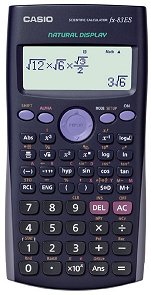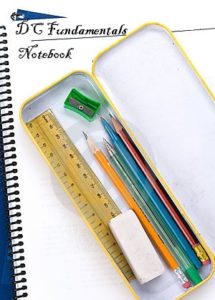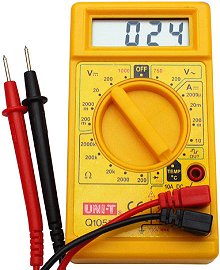What to Bring in Class?
Please make sure that every time you come to D.C. Fundamentals or A.C. Fundamentals you will need to bring the following items:
1. The Floyd text book.
2. A notebook, dedicated to this subject, comprising of at least 120 pages, A4 format. You will need this book to take notes during lectures and solve problems during your class activities.
3. A scientific calculator. Please get into the habit to work with a scientific calculator during your class activities. If you forget it, sometimes you can get away by using your phone as a calculator. However, your phone can only save you in the beginning of the semester. As the material becomes progressively more difficult later on, you will increasingly rely on more “difficult” calculator functions, such as logarithm, square root, sin, cos, tan, complex numbers etc. Essentially you cannot rely on a phone calculator while studying A.C. Fundamentals. Devices with an Internet connection are not allowed on any of the tests. This particular model shown here, for example, is available at the Challenger bookstore and it is good for all purposes throughout your entire studies for this course.
4. A ruler. It doesn’t have to be a very long one. Just about 15 cm long will suffice.
 5. A pen with multiple colour inks. You don’t need to spend a lot of money. The one shown on the photo is available at our bookstore and it only costs about a dollar or two. As you will see later on, when you start working on relatively complex circuits, you will need to label several currents and voltage drops in the same diagram. If you don’t have such a pen, your work will be messy and illegible, which in turn may attract a lower mark, or you will need to re-do the circuit again.
5. A pen with multiple colour inks. You don’t need to spend a lot of money. The one shown on the photo is available at our bookstore and it only costs about a dollar or two. As you will see later on, when you start working on relatively complex circuits, you will need to label several currents and voltage drops in the same diagram. If you don’t have such a pen, your work will be messy and illegible, which in turn may attract a lower mark, or you will need to re-do the circuit again.
6. A pencil, a sharpener and an eraser. Sometimes in class you will be required to analyse electrical circuits for a certain amount of time. The learning process involves making mistakes and this is completely normal. Nobody expects you to get all the answers right on the first try. However, if you work with a pen and you make a mistake, it will be very difficult to correct it. Sometimes a liquid or a tape ‘white-out’ helps, but sometimes it makes things worse. So, in cases like this it makes sense to work with a pencil and have an eraser ready, so that you can quickly correct your work, if you need to. You may wish to combine everything in a pencil case, like the one shown here. Just make sure that you do not leave it behind in the classroom. It makes sense to write your name on it. Otherwise, if you forget it, I will have to add it to my ever increasing collection of students’ lost items :)
 At this point you may wonder why is so much stationary needed? It is all quite simple. We use multiple modes of delivery. Sometimes, a topic can be thoroughly explained with a YouTube video clip, sometimes I need to draw diagrams for you on the board and show you how to solve them, yet at other times I will insist that you write down certain things in your notebooks. Practice shows that short dictations greatly increase student’s capacity to learn and vastly improve their understanding of the subject. The process of writing down information goes a long way towards memorising it! Humans remember much more when they write things down with a pen and paper, rather than typing it on a computer keyboard, or simply reading it from a screen. Not only, will the final result of your writing be more personalised, but having such notes will help you enormously later on, when you are preparing for your final exams. While reading your own notes, you will remember a lot of auxiliary information that has been said in class.
At this point you may wonder why is so much stationary needed? It is all quite simple. We use multiple modes of delivery. Sometimes, a topic can be thoroughly explained with a YouTube video clip, sometimes I need to draw diagrams for you on the board and show you how to solve them, yet at other times I will insist that you write down certain things in your notebooks. Practice shows that short dictations greatly increase student’s capacity to learn and vastly improve their understanding of the subject. The process of writing down information goes a long way towards memorising it! Humans remember much more when they write things down with a pen and paper, rather than typing it on a computer keyboard, or simply reading it from a screen. Not only, will the final result of your writing be more personalised, but having such notes will help you enormously later on, when you are preparing for your final exams. While reading your own notes, you will remember a lot of auxiliary information that has been said in class.
 7. Your digital multimeter. Those who are enrolled in D.C. Fundamentals class will be assigned a personal multimeter, similar to the one shown here, which is yours to keep. Please, don’t forget to bring it along for the days, when you are expected to perform electrical measurements, as part of your laboratory work. Usually, in the first three or four weeks we only cover the basics of theory, in order to introduce you to the subject. After this we gradually begin to do more practical work. In the second term, emphasis is placed on practicals, so you will need to bring your multimeter every week. The multimeter is not needed for A.C. Fundamentals classes, except for the practical workshop number 4: ‘RC Time Constants’. Please, refer to your schedule to see which week this lab is conducted.
7. Your digital multimeter. Those who are enrolled in D.C. Fundamentals class will be assigned a personal multimeter, similar to the one shown here, which is yours to keep. Please, don’t forget to bring it along for the days, when you are expected to perform electrical measurements, as part of your laboratory work. Usually, in the first three or four weeks we only cover the basics of theory, in order to introduce you to the subject. After this we gradually begin to do more practical work. In the second term, emphasis is placed on practicals, so you will need to bring your multimeter every week. The multimeter is not needed for A.C. Fundamentals classes, except for the practical workshop number 4: ‘RC Time Constants’. Please, refer to your schedule to see which week this lab is conducted.
